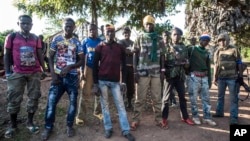Armed men continue breaking into houses and stealing cars in the Central African Republic capital of Bangui, four days after a leader of the armed groups told them to lay down their weapons. Central Africans are asking how much control anyone has over the anti-balaka militias and what role a new political party might play in future peace talks.
The anti-balaka started out as self-defense groups, mainly from Christian ethnic communities, who fought against the largely Muslim Seleka rebel alliance that took over the C.A.R. capital last year.
They are a diverse collection of groups without a strong chain of command, but observers agree that former government minister and chairman of the country’s football federation Patrice Edouard Ngaissona has been a key figure at the center of the network.
Political action
Last Saturday, Ngaissona presided over a general assembly of anti-balaka activists and supporters. He called for the fighters to lay down their arms and announced the movement would be transformed into a political party.
The charge d’affaires at the U.S. embassy in Bangui, David Brown, gave his reaction to Ngaissona’s latest initiative.
"Well, it is certainly a positive announcement, to the extent that one of the central protagonists in [the] crisis, the anti-balaka, their leader, has talked about creating a political movement now, asking his faithful, his supporters, to put down their weapons, and prepare for the Bangui forum and eventually elections," he said.
The C.A.R. government has pledged to organize a forum early next year in Bangui to consider how to reunite the country and end lawlessness.
Urging reconcilliation
The U.S. diplomat cautioned that actions speak louder than words and Ngaissona will be expected to come to the negotiating table in a spirit of peace and reconciliation with his fellow countrymen, including Muslims.
The U.N. peacekeeping mission in the Central African Republic is expected to become more effective, thanks partly to an additional 254 vehicles, including armored troop carriers, the United States is donating to its battalions.
But some aid workers say most of the anti-balaka at the local level no longer listen to Ngaissona. They suggest that other leaders, typically uneducated people claiming magical powers who may have encouraged massacres and other abuses, have more hold over the combatants.
Some international observers say those people should not be allowed seats at the negotiating table.
Brown suggested Ngaissona can play a useful role at the forum.
"Mr. Ngaissona is a recognized coordinator of the anti-balaka, certainly in a position to speak articulately about his followers. But in terms of other [representatives], that is really an internal question for the organization to work out, who they want to represent them, who they think is capable of representing them," he said.
Among the anti-balaka leaders supporting Ngaissona’s new party is former government minister Joachim Kokate, who earlier this year was reported to be leading a rival wing of the movement.
Competing factions
Kokate told VOA it is difficult to control the anti-balaka.
“The real problem is we do not have the resources to look after these people, and when you ask them to listen to you, you must know where they are. There must be a place where you can find them,” he said.
Anti-balaka leaders have been lobbying the government for months to create and support camps in Bangui where their combatants can be based.
Kokate is eager to distance himself from anti-balaka accused of abuses.
If there is proof [of those accusations], he said, then when it has been presented, those people will have to answer in court, as no one is above the law.
Asked if Ngaissona’s new party would be backing former president Francois Bozize as its candidate in elections, Kokate said Bozize has his own party, the KNK. Ngaissona has been viewed as one of Bozize’s closest aides, but that connection may be fraying.




